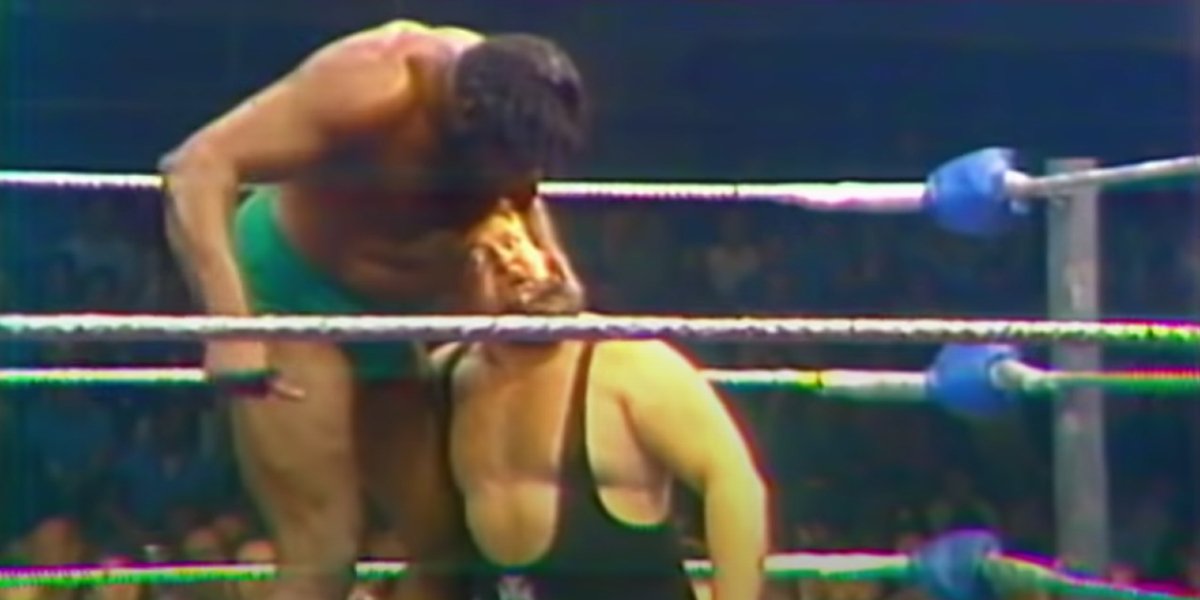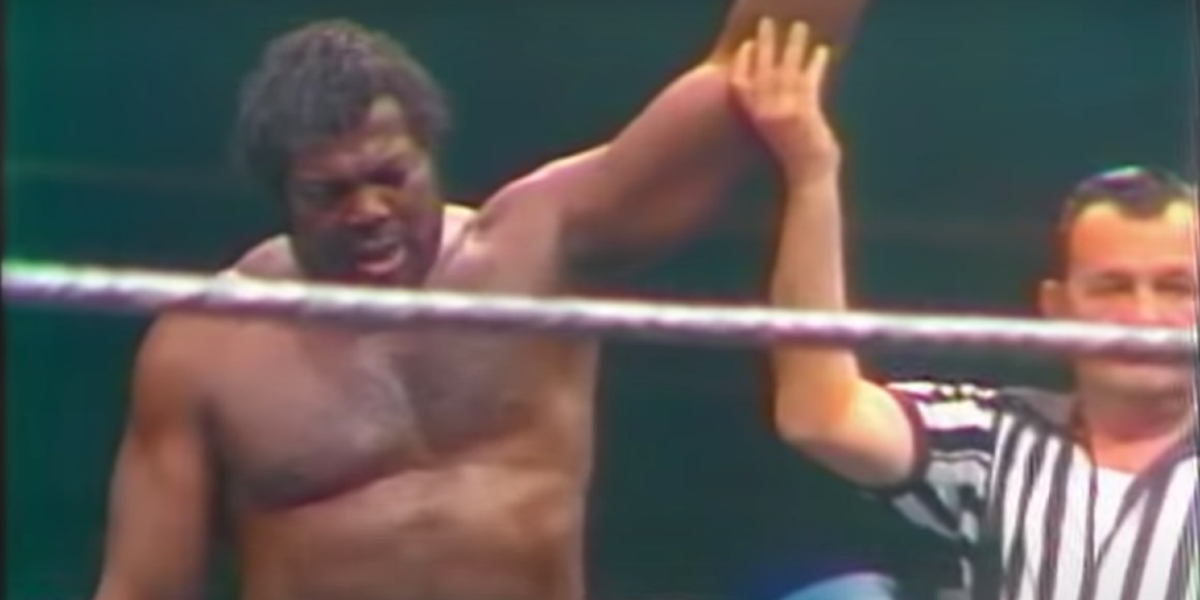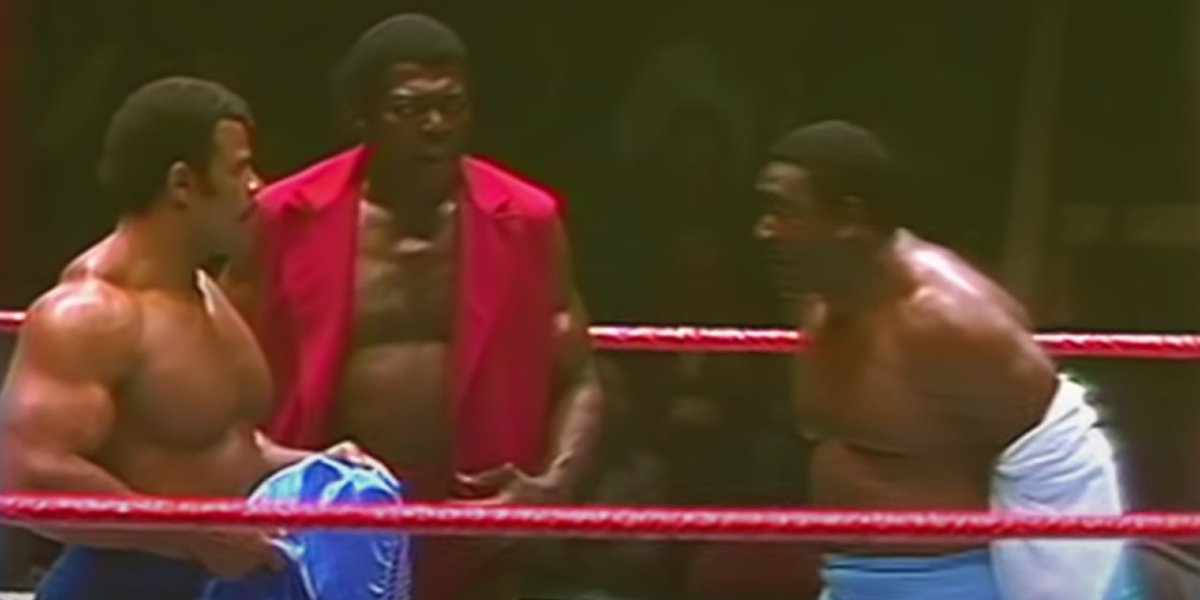Truthfully, it must be underscored on a day-in-day-out basis with Bobo Brazil. As part of the month, we often call out athletic giants and pioneers, men and women who were exceptionally talented and gifted.
One with exemplary poise to have performed in such high-pressure situations, notwithstanding facing hatred and prejudice every step of the way.
In 1936, at the Berlin Third Reich Olmpiade, Jesse Owens made the Fuhrer squirm by dominating track and field events. Owens was snubbed when Hitler refused to shake his hand. Owens, though, would later point out.
_____________________
“When I returned home, FDR didn’t shake my hand either.”
Long-standing barricades were broken down by the likes of Joe Louis, Jacke Robinson, Althea Gibson, and in the world of professional wrestling, Bobo Brazil. It’s time to share his story and learn more about his pivotal role and career, which spanned decades.
Brazil, whose birth name was Houston Harris. He first saw the light of day on the 10th of July 1924 in Little Rock, Arkansas. His family would move around and wound up settling in Benton Harbor, Michigan.
The aforementioned town had a very interesting history. It was there that The House of David was born in the early 20th century. The group was a cult-like commune that blended the teachings of ancient biblical lessons and principles.
This, along with an accent on sports and “leisure,” almost similar to Batista’s Cuba.

The House of David fielded a Negro League team. Harris was a perfect fit on the diamond with his strapping frame and height of 6 foot 6. Benton Harbor, as its name would suggest, was a shipping town and as a young man.
Harris would attend wrestling shows staged in shipyards. It’s definitely conducive to the no flips, just kicks style of FTR.
It was there that Harris was spotted by a performer named Jumping Joe Savoldi. The latter had no ties to the Savoldi clan that ran the ICW promotion in the Northeast. Savoldi’s story is also one worthy of telling. He spoke several dialects of Italian, French, Spanish, German as well as English.
The Emergence of Bobo Brazil
Uncle Sam came knocking on Savoldi’s door and proposed that he take part in delicate and crucial undercover espionage operations in Europe. The United States partook in WW II as of late 1941, and Savoldi began serving his country shortly thereafter.
A hero overseas and a visionary Stateside. Savoldi saw something special in Brazil and took it upon himself to train him and prepare him for the wrestling world. Savoldi can be said to have been the Branch Rickey of wrestling.
Brazil debuted in 1951 and not only made history, but he also did so over a very long time. Brazil wrestled until he was 69 years of age. I remember having seen him at the end of his career, and he was a total warhorse. While he had obviously lost some of the zip-off his fastball, he was always in splendid shape.
Brazil was also someone who set fashion standards. He straightened his hair throughout his career and always wore elaborate robes and gear that were more stylish than flamboyant. His in-ring style was hard-hitting and appealing without being outlandish and flamboyant. Brazil did not provide comic relief, but he did lay the smackdown on his foes.
One sad element of his legacy was that his finishing maneuver in many a match was the head butt or Coco Bonk. Commonly assigned to African American and South Pacific talent, this move implied the misconception of non-whites having thicker skulls than their opponents.
Being a groundbreaker did not preclude one from being reduced to a racial stereotype nonetheless. You can be a pioneer just don’t neglect to give the people what they want.
An International Talent
Brazil took his talents all over the world. His home base was Detroit, and he had tremendous rivalries with Paul Farhat, the original Sheik. Blading and blood capsules were standard fare when these two locked horns.
Brazil also had notable programs with the industry’s biggest names, including Nature Boy Buddy Rogers, Killer Kowalski, Johnny Valentine, Wild Bill Miller, and Dick the Bruiser. Once the public became comfortable with seeing interracial combats, Brazil was the toast of the town.
He can be said to have set the table, given his size, strength, and overall ability. This was not a question of tolerance. In fact, it was a simple insistence on being able to watch the highest level of performance, hence abandoning old ways of thinking.

Brazil was more drenched in gold than even King Midas. Back in the days of the territories, Federations would have numerous regional champions as opposed to national titleholders. This made sense at the time.
Anywhere west of the Mississippi was deemed as inaccessible as, say, Australia. A champion fighting out of Philadelphia would be a virtual unknown to those in San Antonio or Spokane.
You could basically choose any region of North America and discover that Brazil held titles there. Starting in the Northeast, he was the WWWF United States champion no fewer than seven times.
Wrestling out of the NWA Detroit territory, he was a nine-time U.S. Heavyweight champion on nine occasions and the tag team champion on seven. He was also recognized as a champion by territories in Toronto, San Francisco, Florida, and the Mid-Atlantic region.
Megastar Status
In other accolades and milestones, Brazil became the first African American to attain megastar status in the land of the rising sun. In 1970, he was featured in the very first interracial tag team match, which was staged in Atlanta.
As pointed out by Phillip Pledge writing in the June 6th, 2020 publication of Cinemaland :

“Boxing Icon Joe Frazier Once Named Bobo Brazil Among His Sports Idols
For about as long as professional wrestling has been a major form of entertainment, it has blossomed in the city of Detroit, Michigan.
Long before Hulk Hogan and André the Giant created one of the most iconic moments in wrestling history at WrestleMania III in 1987, the likes of the Sheik (not the Iron Sheik who later became popular) and Abdullah the Butcher, but none really compared to the career and legacy of Bobo Brazil.
Bobo Brazil’s impact went beyond the city of Detroit in the years following his debut in professional wrestling; in fact, it went further than professional wrestling.
In a February 1970 New York Times (via Grantland) article profiling then up-and-coming boxer Joe Frazier, the one-day heavyweight champion talked about his early idols, which included Brazil among some legendary names:
I was about 17 when I got interested in boxing, and the guys I remember hearing about were Joe Louis, Sugar Ray Robinson, Hurricane Jackson, and Bobo Brazil.

In the same article, Pledge pointed out that Brazil was happy to give back to the sport as well. One of his projects was mentoring a particularly well-built kid from Nova Scotia. Thus, Rocky Johnson became an international superstar and broke ground as the very first African American tag team championship tandem.
“As Bobo Brazil’s career began to slow down in the 1970s, he started mentoring younger wrestlers and helped them build themselves up to reach their full potential.
One of Brazil’s most notable friends and proteges was none other than “Soulman” Rocky Johnson, the late father of future WWE Champion Dwayne “The Rock” Johnson.
Much like his son would do later in the 20th Century, the elder Johnson, with the help of Bobo Brazil, helped further break down racial barriers in all corners of the squared circle and helped open doors for future superstars of color in all territories.
Rocky Johnson, along with his tag team partner Tony Atlas, secured the WWF World Tag Team Championship in 1983, making them the first black champions in the promotion’s history.”
Bobo Brazil Became The First African-American Wrestler To Be Inducted Into The WWE Hall Of Fame
In 1993, WWE (then-WWF) created a hall of fame to honor André the Giant’s recent passing and continued the tradition the following year with a full-fledged ceremony. The WWE Hall of Fame class of 1994 included Arnold Skaaland, Buddy Rogers, Chief Jay Strongbow, “Classy” Freddie Blassie, Gorilla Monsoon, James Dudley, and Bobo Brazil.
With his induction into the Hall of Fame, Bobo Brazil became the first of many African-American wrestlers to join the prestigious group of wrestlers and managers, further opening the door for people like Ernie Ladd, Junkyard Dog, Rocky Johnson, and countless other wrestlers of color over the years.
I sincerely hope this has opened your eyes to the life, career, and legacy of Bobo Brazil. And what he means to professional wrestling and all sports in general. He may not get as much recognition for his contributions as those to come after him.
But the gentle giant with his signature “Coco Butt” head-butt and larger-than-life demeanor is someone all wrestling fans should get to know. It doesn’t hurt that he has thousands of great matches to watch as well.”
Hall of Famer
Brazil was also inducted into the NWA Hall of Fame as well as the Professional Wrestling Hall of Fame. The Hall of Fame was, up until recently, located in the scenic Adirondack town of Amsterdam, New York.
Here are excerpts of Brazil’s induction biography written by Dave Drason Bryzinski. The latter was an on-air personality on the Superstars of Wrestling Canadian production run by George Cannon.
He portrayed the verbose manager Supermouth Dave Drason. His fond recollections a delight to read.
“Outside the ring, he would always go out of his way to bring himself to the level of those who had to look up so high to this giant of a man, shake their hand, exchange light chatter, and make them feel like a mountain among men when he called them “Champ”, his favorite expression.
In the dressing room, he was a presence of royalty. His infectious laughter would fill the room as did his ever present cigar. He was respected by all who came to greet him, and treated everyone an equal whether you were a main eventer or a green rookie.
From every promoter, wrestler or fan who crossed paths with Bobo during their career, man for man will attest to you that he was the consummate wrestler, entertainer and friend.
Wherever he appeared, his heart was always pointing in the direction of home, where his wife and six children eagerly awaited his return to Benton Harbor”
Bobo Brazil’s legacy is felt every time we watch or stream a wrestling show. He paved the way for change in sports and society. He helped pass the torch lit by the likes of Rosa Parks, Jack Johnson, and so many more—a down-to-earth man with blue-collar roots.
Bobo Brazil had a huge sense of adventure and left his footprint in an evolving and fascinating phase of our history.










